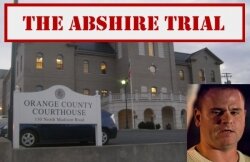Day six: All about the money
Did Eric Abshire know he stood to collect $1.5 million if his wife died in a hit and run, and did he attempt to collect that money? Those questions were the subject of testimony on Wednesday, October 19, as the prosecution in the first-degree murder trial of the incarcerated Greene County dump truck driver worked its way toward the end of its witness list, only to be cut short by a bomb threat in the courthouse.
"There's a situation in the building," said Orange County Circuit Court Judge Daniel Bouton as court watchers returned to the courtroom after lunch at approximately 1:30pm. Alerting the courtroom attendees to the threat, he also attempted to offer comfort.
"There's no reason to have any basis to panic or to fear," said Bouton, who suggested that the threat was related to a case other than Abshire's. Bouton excused the jury and witnesses, then proved he didn't consider the threat imminent by asking, before completing the evacuation, the prosecution and defense if there were any further motions to consider.
While the day's proceedings were abbreviated by the unrelated drama, the morning's testimony offered plenty for court-watchers to ponder.
In August 2008, a month after ABC aired an hour-long Primetime Crime episode on Justine Swartz Abshire's November 3, 2006, death, which was initially reported as a hit and run, Abshire sat down with this Hook reporter at a local coffee shop to discuss his wife's death and the suspicions swirling around him. In that interview and in other public statements, he denied any efforts to collect insurance money. Trial testimony suggests that wasn't the case.
"Eric initiated the claim," testified Marchel Badger, who works for Erie Insurance, the company that insured Justine's 2002 Ford Mustang. She was describing a November 15, 2006, call– less than two weeks after Justine's death– in which Abshire filed an uninsured motorist claim that would have paid him $100,000.
Uninsured motorist is standard coverage that also protects against unidentified drivers, such as perpetrators of a hit-and-run. Abshire, however, wouldn't be receiving any money from that policy or from another policy on the three vehicles he owned at the time: a 2002 Suzuki motorcycle, a 1993 Acura Integra, and a 1995 Eagle Talon. Investigators for both insurers testified Wednesday that amid the active police investigation, they denied his claims.
One policy Abshire didn't attempt to collect on: million-dollar uninsured motorist coverage on a dump truck.
"Her credit was better," he told the Hook in August 2008, explaining why he had put the commercial vehicle in Justine's name. October 19 testimony, however, suggested that Justine may not have known she was also insured heavily for the truck her parents have long maintained she wasn't even licensed to drive.
According to Chesapeake-based insurance agent James Dominesey, Abshire seemed to have a hard time getting Justine to sign the policy.
"He said he was having trouble getting up with her," Dominesey testified, noting that Abshire never mentioned that the person he was having trouble tracking down was the fiancée he was living with.
Eventually, said Dominesey, the policy bearing Justine's signature was faxed back to him. But two subsequent witnesses familiar with the handwriting of Justine and Abshire testified Wednesday and seemed to be positioning the prosecution to show that Abshire forged her signature on the policy when it was taken out in March 2006, just eight months before her death.
With the bomb threat cancellation of the Wednesday afternoon session, further handwriting testimony is expected on Thursday, October 20, as the prosecution prepares to rest its case.

1 comment
Let us take an example of Texas. The "Penny Health" is quite popular in Arizona. It provides so many offers for the low income people.